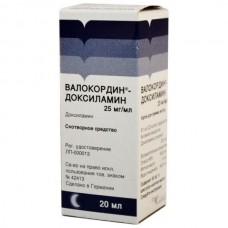Expiration date: 07/2030
Release Form: Drops for oral administration
Composition
1 ml (22 drops) contains:
Active ingredient: doxilamine succinate - 25.0 mg.
Excipients: ethanol 96% - 450.0 mg, peppermint oil - 1.4 mg, purified water - 449.7 mg.
Packaging: 20 ml vial.
Pharmachologic effect
Pharmacodynamics
Blocker of H1-histamine receptors from the group ethanolamines. The drug has a hypnotic, sedative and m-anticholinergic action. Reduces sleep time, increases the duration and quality of sleep, it does not change the phase of sleep.
Doxylamine is rapidly and almost completely absorbed after oral administration immediately. The action begins within 30 minutes, the maximal concentration in blood serum 99 ng / ml observed after 2.0-2.4 hour after oral dose of 25 mg. Duration from 3 to 6 hours.
Pharmacokinetics
Mainly metabolized by the liver. It penetrates through the blood-tissue barriers (including the blood-brain barrier). The half-life ranged from 10.1 to 12 hours. The main part of the dose (. Ca 60%) is excreted unchanged in the urine, in part - the intestines.
Testimony
Symptomatic treatment of periodic sleep disturbance (difficulty falling asleep and waking up at night) in adults.
Contraindications
- Hypersensitivity to doxylamine, and other ingredients.
- Angle-closure glaucoma.
- Prostatic hyperplasia, urinary retention.
- Childhood and adolescence.
Precautions: pregnancy, liver disease, alcoholism, head injury or brain disease.
Pregnancy and breast-feeding
Valocordin-doxylamine can be used during pregnancy only if the expected benefit to the mother outweighs the potential risk to the fetus.
Breastfeeding should be discontinued during treatment because the active substance is released in breast milk.
Dosing and Administration
For oral administration.
Drops should be taken with plenty of fluid (water) for 30 minutes - 1 hour before sleep.
If your doctor is not indicated differently, the single dose of the drug-Valocordin doxylamine for adults is 22 drops (corresponding to 25.0 mg doxilamine succinate). For serious sleep disorders, the patient can take the maximum dose - 44 drops (corresponding to 50.0 mg doxilamine succinate).
The total daily dose should not exceed 44 drops.
Please note that after taking the drug, doxylamine Valocordin should take care of sufficient time for sleep to avoid the slow reaction the next morning.
Use in special patient groups
Patients with renal and hepatic insufficiency
In connection with the data to increase the concentration in plasma and the plasma clearance decreases doxilamine recommended dosage adjustment downwards.
Use in patients older than 65 years
Blockers H1-histamine receptors should be used with caution in this group of patients because of dizziness and a delayed reaction to the danger of falling (eg, at night awakenings after receiving hypnotics).
Course duration
Acute sleep disorders as possible should be limited to a single application. To appear periodically during sleep disorders to test the need for continued treatment is necessary, no later than 14 days after the start of daily use to gradually reduce the dose.
Side effects
The frequency of side effects is given in accordance with the following scale:
Very often - 1/10 appointments (> ,, 10%).
Frequent - 1/100 appointments (> ,, 1% and <10 ,, = "" li = "">,
Infrequent - 1/1000 appointments (> ,, 0.1% and <1 ,, = "" li = "">,
Rare - 1/10000 appointments (> ,, 0.01% and <= ,, 0 "," 1 = "" li = "">,
Very rare - less than one ten thousandth of appointments (<0 ,, = "" 01 = "" li = "">,
The most frequently reported side effects: constipation, dry mouth, accommodation disorders, urinary retention, drowsiness during the day (in this case, the dose should be reduced).
Less (from 0.01% to 10%) are probable:
Cardiovascular system: may cause tachycardia, cardiac arrhythmias, decreased or increased blood pressure, and decompensation of existing cardiac arrhythmia. Possible changes in the ECG.
Hematopoiesis system and lymphatic system: in very rare cases, after the application of antihistamines may appear in the blood picture changes in the form of leukopenia, thrombocytopenia, hemolytic anemia, and very rarely aplastic anemia have been observed, and agranulocytosis.
Nervous system: dizziness, headache.
Disorders of: increased intraocular pressure.
Disorders of the ear and ear labyrinth: tinnitus.
Respiratory system: thickening of bronchial secretions, bronchial obstruction, and bronchospasm that may lead to a deterioration of respiratory function.
Gastrointestinal tract: nausea, vomiting, diarrhea, loss of or increase in appetite, epigastric pain. In very rare cases may be life-threatening paralytic ileus. It reported violations of the liver (cholestatic jaundice) during therapy with blockers of H1-histamine receptors.
Urinary system: violation of urination.
Skin: may experience allergic skin reactions, photosensitivity disorders, and thermoregulation.
Endocrine system: patients with pheochromocytoma receiving antihistamines can lead to increased release of catecholamines.
General disorders: feeling of nasal congestion, fatigue, muscle weakness.
Psychiatric disorders: undesirable effects, which depend on individual sensitivity and the dose are: slow response, impaired concentration, low mood. In addition, there is a probability of occurrence of the so-called "paradoxical" reactions such as anxiety, nervous excitement, emotional stress, insomnia, night "nightmares", confusion, hallucinations, tremor. After prolonged daily use on the background of a sudden discontinuation may worsen sleep disorders.
The development of tolerance: after long-term use of sedatives can cause loss of efficiency (tolerance).
Dependence: as taking other sedatives, reception valokordin-doxylamine can lead to physical and psychological dependence. The risk of dependence increases with dose and duration of treatment and increased in patients with alcohol, drug or drug addiction in history. Even at the end of the short-term treatment valokordin-doxylamine because of the sudden cancellation may again be temporary sleep disorders. Therefore, it is recommended, if necessary, to complete the treatment, gradually reducing the dose.
Anterograde amnesia: even in therapeutic doses, sedatives may trigger anterograde amnesia, especially in the first few hours after ingestion. The risk increases with the dose, but may be reduced due to a sufficiently long continuous sleep (7-8 hours).


